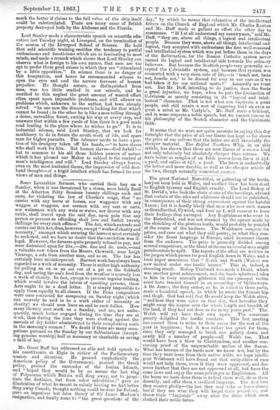Some Lancashire farmers, who carried their hay on. a Sunday,
when it was threatened by a storm, were lately fined at the Atherton Petty Sessions twenty shillings each and costs, for violating the law of Charles's reign, that "no -carrier with any horse or horses, nor waggoner with any waggon or waggons, nor carman with any cart or carts, nor wainsman with any wain or waius, nor drover with any cattle, shall travel upon the said day, upon pain that any -person or persons so offending shall lose and forfeit twenty shillings for every such offence." The Act, which extends and carries out this Act, does, however, except " works of charity and necessity," amongst which securing the harvest must certainly be reckoned, and we have no doubt that the conviction was il- legal. However, the farmers quite properly refused to pay, and were distrained upon for 23s.,-20s. fine and 3s. costs,—and a valuable cow taken from the Messrs. Cleworth, near Leigh Vicarage, a sofa from another man, and so on. The law- has certainly been misinterpreted. Harvest work has always been regarded as a work of necessity. There is rather high authority for pulling an ox or an ass out of a pit on the Sabbath day, and saving the ass's food from the weather is scarcely less a work of charity. In fact, except to prevent regular trading, which would involve the labour of unwilling persons, these Acts ought to be a dead letter. It is simply impossible to apply them equally to all classes. If the Times compositors were once convicted for composing on Sunday night (which can scarcely be said to be a work either of necessity or charity) we should soon have an end to such follies. How many literary men work on a Sunday, and are, not unfre- quently, much better engaged during the time they are at work, than clarity, the time they were chafing against the morsels of dry fodder administered to their complaining souls in the morning's sermon ? We doubt if there are many occu- pations pursued on the Sunday by our Sabbatarians (except- ing genuine worship) half as necessary or charitable as saving a field of hay.


































 Previous page
Previous page